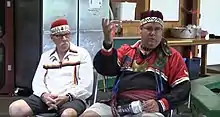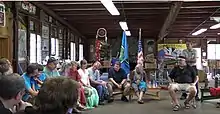Nulhegan Band of the Coosuk Abenaki Nation
The Nulhegan Band of the Coosuk-Abenaki Nation, formerly a nonprofit organization,[1][2] is a state-recognized tribe from Vermont.[3][4] They are often referred to as the Nulhegan Abenaki Tribe or simply, Nulhegan.[5] Numbering approximately 1,400 enrolled members, most members reside in Orleans County and the adjacent counties in the Northeast Kingdom of Vermont.[6] The Nulhegan Tribe was recognized as a Native American tribe by the State of Vermont in 2011.[7] The Nulhegan are one of 4 state-recognized tribes in Vermont. They participate at the state level in many ways, including in the Vermont Commission of Native American Affairs.[8]

Gatherings
The Nulhegan Abenaki Tribe host multiple gatherings every year. The first is at the Winter Solstice in late December. The second is the annual Snow Snake Games held at the end of February or early March. The last and biggest gathering is the annual Nulheganaki gathering held every year at the end of August or beginning of September.[9][10][11]

Controversy
The legitimacy of the Nulhegan Band has been questioned due to root ancestors erroneously being listed as Native. Other root ancestors, though Native, were not Abenaki.[12][13] In the 2005 petition for federal recognition of an affiliated band, the BIA states
The details of this claimed process of living “underground,” however, are not explained by the petitioner. Some of the available documentation indicates that some of the group's ancestors moved from various locations in Quebec, Canada, to the United States over the course of the 19th century, but the available evidence does not demonstrate that the petitioner or its claimed ancestors descended from the St. Francis Indians of Quebec, another Indian group in Canada, a Missisquoi Abenaki entity in Vermont, or any other Western Abenaki group or Indian entity from New England in existence before or after 1800. The available evidence indicates that no external observers from 1800 to 1975 described the petitioner or its claimed ancestors, or any group of Indians, as an Indian entity or a distinct Indian community in northwestern Vermont.[emphasis added]
References
- "NULHEGAN BAND OF THE COOSUK-ABENAKI PEOPLE INC. 2004". Vermont Secretary of State. State of Vermont. Retrieved 3 November 2019.
- "NULHEGAN BAND OF THE COOSUK-ABENAKI PEOPLE INC. 2006". Vermont Secretary of State. State of Vermont. Retrieved 3 November 2019.
- "2012 Vermont Statutes Title 01 General Provisions Chapter 23 NATIVE AMERICAN INDIAN PEOPLE § 854 Recognition of Nulhegan Band of the Coosuk Abenaki Nation". JUSTIA US Law. State of Vermont. Retrieved 3 November 2019.
- "No. 107. An act relating to state recognition of Native American Indian tribes in Vermont" (PDF). Vermont General Assembly. 14 May 2010. p. 13. Archived (PDF) from the original on 21 January 2019. Retrieved 2 April 2019.
- Miller, Hinda; Illuzzi, Vincent; Carris, William H.; Lyons, Virginia "Ginny" (2011–2012). "An Act Relating to Recognition of the Nulhegan Band of the Coosuk Abenaki Nation as a Native American Indian Tribe". Vermont General Assembly. Archived from the original on 21 January 2019. Retrieved 2 April 2019.
- Flowers, John (August 2, 2017). "Chief Don Stevens keeps Abenaki legacy alive, wants to ensure tribal customs and culture endure". Addison County Independent. Retrieved 14 January 2020.
The Nulhegan, who number around 1,400; a slightly lesser number of the Missisquoi, based in Franklin County; the Elnu, centered in the Jamaica/Putney area; and the Koasek, located in Haverhill, N.H./Newbury, Vt., area. Stevens said the Elnu and Koasek tribes count around 150 members each.
- "Vermont Statutes". JUSTIA US Law. Retrieved 14 January 2020.
- "State Recognized Tribes". Vermont Commission on Native American Affairs. Retrieved 14 January 2020.
- Sari, Kymela (Feb 26, 2018). "Abenakis Gather for Traditional Snow Snake Game in West Barnet". Seven Days. Retrieved 14 January 2020.
- "7th Annual Nulhegan Abenaki Heritage Gathering". Vermont Digger. Vermont Journalism Trust. Retrieved 14 January 2020.
- Trombly, Justin (Jan 12, 2020). "Abenaki partner with Sterling College to cultivate long-lost crops". Vermont Digger. Vermont Journalism Trust. Retrieved 14 January 2020.
- Eidinger, Andrea. "Nulhegan Abenaki Tribe (ABENAKI TRIBE AT NULHEGAN~MEMPHREMAGOG)". Raceshifting.com. Raceshifting. Retrieved 3 November 2019.
- Laroux, Darryl (2019). Distorted Descent - White Claims to Indigenous Identity (First ed.). University of Manitoba Press. p. 218. ISBN 978-0-88755-846-7.
- "Proposed Finding Against Federal Acknowledgment of the St. Francis/Sokoki Band of Abenakis of Vermont". Federal Register. Indian Affairs Bureau. November 17, 2005. Retrieved 14 January 2020.